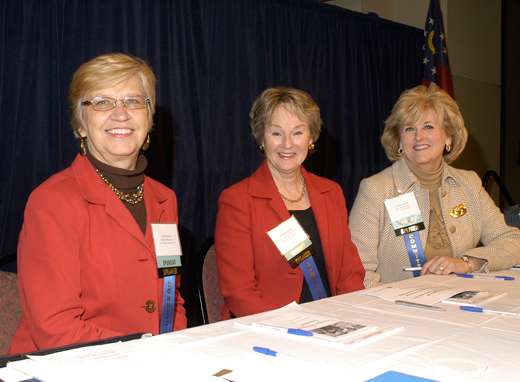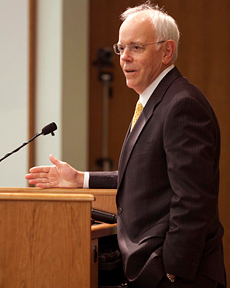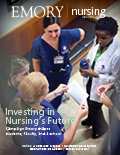A Call to Action

Georgia Nursing Summit leaders included Emory nursing Dean Linda McCauley (left); Charlotte Weaver, senior vice president and chief clinical officer with Gentiva Health Services; and Lisa Eichelberger, dean of the College of Health at Clayton State University.
Emory co-hosts Georgia Nursing Summit
|
Wright Caughman, Emory’s executive vice president for health affairs, was part of an interdisciplinary panel at the Georgia Nursing Summit. |
Last fall, when the Institute of Medicine (IOM) and the Robert Wood Johnson Foundation released their report on The Future of Nursing: Leading Change, Advancing Care, the high volume of traffic on the IOM website caused the system to crash.
This past winter, 350 health leaders from across Georgia packed a meeting room to discuss the report and how to implement its recommendations. Emory nursing Dean Linda McCauley was among the organizers of the Georgia Nursing Summit, which was held in downtown Atlanta.
As McCauley told The Atlanta Journal-Constitution this past spring, “The IOM report isn’t just a nursing report. It’s a report that shows how nursing can play an integral part in solving the challenges that face health care in our country.”
The obstacles are huge. By 2030, the number of Americans 65 and older is projected to grow by 79%. Most people in this group have at least one chronic illness. The Affordable Health Care Act calls for millions of people to gain insurance coverage. At the same time, the nation is experiencing shortages of nurses and primary care physicians.
To confront these issues, The Future of Nursing recommends that nurses be allowed to practice to the full scope of their education and training. It calls for equipping them with higher levels of education and better data for workforce planning. Finally, it asks nurses to assume leadership positions and become full partners—with physicians and other health care professionals—in improving the health care system.
“We can give the highest quality care at the best price if we work together as a team,” said Wright Caughman, Emory’s executive vice president for health affairs, during the Georgia Nursing Summit. “We have to make sure that you get the power to do what you are capable of doing.”
Toward that end, the School of Nursing is building on its commitment to produce engaged nursing leaders. It is developing more clinical partnerships and new clinical leadership programs for nursing students and professionals. It is revamping the nursing curriculum. And it continues to find ways to attract promising students.
For example, the school transformed its Robert W. Woodruff Clinical Scholarship program to provide full tuition for students exhibiting a strong interest in improving the health care delivery system. Eight students recently received these scholarships.
“With the Woodruff Scholars program,” McCauley says, “we are helping to shape the future of nursing by developing the next generation of nurse leaders.”
Anjli Aurora Hinman 06N 07MN is among the new wave of nursing leaders. Hinman, a family nurse-midwife, served on the national Future of Nursing committee and spoke at the Georgia Nursing Summit.
The night before the meeting, she was on call and delivered a baby early that morning.
“I feel a huge responsibility for our future,” Hinman told summit participants. “I need to make sure that new babies are coming into a world that assures their health.”
|
Web Connection: To learn more about the Initiative on the Future of Nursing, visit thefutureofnursing.org. |
||||



